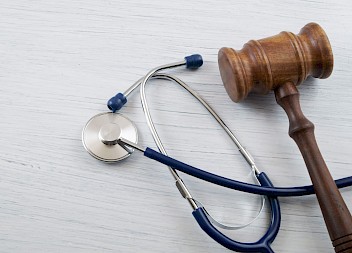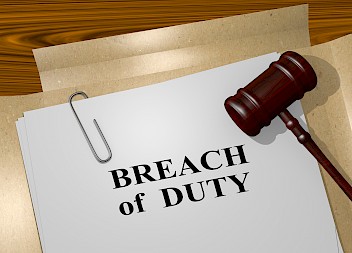Throughout the coronavirus pandemic, the NHS has undoubtedly been the lionhearted hero leading the battle against this invisible enemy. Its army of clinical staff on the frontline have rightfully been saluted for their undeniable dedication and bravery during such harrowing circumstances.
However, in this fast-moving crisis, unique clinical challenges have led to difficult medical decisions. From the legal perspective, once the dust settles, we will begin to naturally reflect on poor outcomes for patients. It is possible that there could be an exponential rise in future coronavirus-related medical negligence claims.
So, are we heading from one health crisis to another?
COVID-19 has inevitably intensified pressure felt by our treasured health service that was already over-stretched and buckling under the strain.
Demand for intensive care and inpatient resources has risen. Medical professionals have been pulled from pillar to post, often working beyond their specialisms. New and alternate protocols have been put in place and mistakes have unsurprisingly happened.
It is in the context of broader clinical decision-making where we may see most negligence claims arise. General health concerns in non-virus-affected patients have been deemed low priority with primary care services suspended, GP practices closed, non-urgent operations postponed, and CQC inspections cancelled.
While we’ve all been advised to stay home, protect the NHS and save lives, this is predicted to have an adverse effect in the long term. A recent government report suggests there could be up to 200,000 people who will die unnecessarily due to healthcare delays caused by the coronavirus lockdown.
Those with serious illnesses unrelated to coronavirus have been neglected during the pandemic and life-threatening diseases have gone undetected. Thousands of people have not received life-saving care for heart attacks and strokes, while others have had delayed diagnosis for chronic conditions such as diabetes and kidney disease.
Panorama highlights how COVID-19 has affected people living with cancer
Cancer services have also suffered a huge blow, with new data released predicting up to 35,000 excess deaths this year from cancer. Oncologist Professor Karol Sikora, who has been vocal throughout the pandemic, fears true figures could be worse than that at almost 60,000.
A recent Panorama investigation found that 2.5million people have been affected by the government’s guidance to suspend all cancer services during the pandemic. This includes chemotherapy, radiotherapy and drug trial services, with wait times at an all-time high.
- Over two-million screening invitations have not been sent out.
- GP referrals are down two-thirds from 199,217 (April 2019) to 79,573 (April 2020)
- 290,000 people have forgone urgent referrals to confirm or rule out cancerous tumours
- 21,600 people living with cancer have had potentially life-saving treatment postponed.
- For those who have been diagnosed with cancer following a screening programme, less than half (47.9 percent) received treatment within the two-month target.
However, cancer hasn’t stopped because of Covid. Panorama showed just how quickly and relentlessly cancer can devastate people’s lives if left untreated for just a few months.
A 31-year-old mother with stage four bowel cancer died in June after it was advised she could ‘afford to’ take a 12-week break from chemotherapy to protect her from catching coronavirus during treatment. She challenged it and they compromised with a blood test halfway through to monitor her condition. She passed away before that date.
One man told how he went to A&E 13 times with persistent groin pain and pushed for a scan but was told there was a two-month wait due to COVID-19. By the time he was eventually given a scan, a 14cm tumour was found in his pelvis too large to remove. They also found 20 tumours in his lungs. His prognosis is three to 12 months to live, which could have been extended if the rare form of cancer was found when he originally sought medical help.
Another lady was facing the decision to pay privately to the tune of £250,000 to continue a successful clinical trial she’d received on the NHS pre-Covid. Because it would be such a complex procedure, the NHS said they simply didn’t have enough staff to cover this.
These situations are not unique, and the effects caused by cutting back on ‘less critical’ or ‘non-urgent’ care will ricochet through our society.
Even at General Practice level, a recent report by The Royal College of General Practitioners (RCGP) found that in-person appointments dropped nationally from 70 to 23 percent in the first few weeks of lockdown measures being put in place. This may not be set to improve anytime soon, with ‘total triage’ appointments via telephone or video call being considered the new normal and a ‘positive change’ moving forward for GP surgeries.
The clear danger is that adequate and/or correct diagnosis cannot be done effectively, at times, without a face-to-face examination.
Coronavirus Act 2020 provides additional indemnity cover
The government seems to have predicted a rise in coronavirus-related medical negligence claims, anticipated by new powers listed under the Coronavirus Act 2020 in conjunction with NHS Resolution’s new scheme solely for COVID-19 related claims.
Clauses 10 to 12 of the Act agree to provide additional indemnity coverage for any clinical negligence liabilities that may arise from the coronavirus outbreak and the special healthcare agreements that were put in place which have altered the workings of our healthcare system.
Pre-Covid, the National Audit Office (NAO) said claims costs to the NHS were rising faster than funding and had reached record levels. In 2018/19, the NHS paid out £9billion in medical negligence compensation, with a further £83.4bn outstanding for claims that were still being processed.
During the pandemic, final year medical students, those who had left the profession, and retired clinicians have been deployed to the frontline fight. To that end, how many patients were treated by staff whose training was unfinished or out of date, potentially resulting in inadequate care.
Should Coronavirus mean doctors are exempt from medical negligence claims?
When assessing medical negligence claims, the ‘Bolam test’ sets out that care provided should only be of a ‘reasonable’ standard, being the care one would expect of a responsible body of similar healthcare providers. For example, nurses are compared to those doing similar roles, and a junior doctor would not be expected to have the same skill and knowledge as an experienced consultant.
Regardless of this, the Medical Defence Union (MDU) is calling for medical professionals to be granted immunity from coronavirus-related medical negligence claims, insinuating any compensation awarded will be a drain on NHS resources – and the British taxpayer. They also state it will spare them from the ‘stress and anxiety caused’ by the prospect of future claims. This is dangerous. Covid should not be a safety net to hide behind mistakes. If this is agreed, it will set a precedent to lowering clinical standards indefinitely.
This also makes a mockery of the justice system. The judiciary is charged with delivering justice in relation to challenges to clinical decision-making. Courts should be trusted to deal with these claims fairly and respectfully, considering the unprecedented clinical challenges faced by NHS staff, whilst also not undermining the rights of vulnerable victims of healthcare mistakes.
About the Medical Negligence Claims process
When our clients choose to sue the NHS, they do not make the decision lightly. They know that any compensation they may receive is not a lottery win; there are no real winners after all as often the claim is brought about in exceptionally life-changing circumstances.
Compensation is based on any treatment, care, therapy or rehabilitation a client may need for the remainder of their life due to the improper or negligent care they received.
We also advise our clients that any monies recovered does not come from the same pot used to pay for treatment for someone else. The NHS sets money aside specifically for claims in its budget every year to ‘self-insure’ (this sum comprises less than one percent of the annual budget). Victims of healthcare errors should not be made to feel guilty for someone else’s mistake.
As medical negligence solicitors, we do not have to prove 100 percent that a single act or omission resulted in harm, injury or worsening of a condition. Neither can claims be made on hypothetical scenarios. Breach of duty of care is based on the balance of probabilities, not certainty.
It is highly probable that many people using NHS services this year will face a delay. Whether that be delays in diagnosis, being referred to a specialist clinician, or in treatment, the huge backlogs now faced in most NHS departments means waiting times will increase.
And how many people’s quality of life will be affected by this.
The NHS’s complaints process was paused during the first three months of lockdown and recommenced on 1st July. Patients have been able to make complaints during this time but no further action has been taken.
However, time limitations of three years post-incident are still in place so please do not delay seeking legal advice for coronavirus-related medical negligence claims.
Accessing a Specialist Solicitor
Medical Solicitors’ director, Caroline Moore, is a qualified solicitor of over 30 years, 18 of those specialising in medical cases. She and her team are there to support you through the civil matters of the medical complaints process.
If you need support or guidance relating to medical negligence claims caused by COVID-19 healthcare delays, then please get in touch on 0114 2507100 or email info@medical-solicitors.com





